Receive free Spanish politics updates
We’ll send you a myFT Daily Digest email rounding up the latest Spanish politics news every morning.
Spain’s conservative opposition has been given the first chance to try to form a government by the king after an inconclusive general election, even though the party did not have enough support at the time of the announcement on Tuesday.
The opposition People’s party, led by Alberto Núñez Feijóo, won the most seats in the July election, but neither it nor acting Socialist prime minister Pedro Sánchez emerged with an obvious path to a parliamentary majority.
Sánchez, who has vowed to lead another “progressive” government, says he is the only person who can achieve the 176-seat majority needed in the 350-seat parliament to take office. He wants to do so by striking pacts with five smaller regional parties — including Catalan and Basque separatists — as well as Sumar, a leftwing group that is his preferred coalition partner.
Earlier on Tuesday, Sánchez said he would respect the king’s decision, but he added: “I think everyone knows, even Mr Feijóo himself, that it would be a failed investiture” vote if the PP leader tried to become prime minister.
If Feijóo does not succeed following King Felipe VI’s decision, Sánchez will be given a chance to form a government two months afterwards. If he fails, Spain will be forced to hold repeat elections, as it did in 2015-16 and 2019.
Sánchez scored an important win last week when the parties he is courting backed his choice for speaker of congress last week with 178 votes. They included the votes of his most difficult potential partner, Together for Catalonia, a radical separatist group founded by exiled former Catalan leader Carles Puigdemont.
But the royal palace signalled that Sánchez had not yet locked in the support of the smaller parties for another term in office.
In a statement that followed two days of talks between the king and political leaders, the palace said: “In the consultation procedure carried out by [the king], it has not been established that there is at present a sufficient majority for the investiture [of a new prime minister].”
As a result, it said, there was no reason to abandon the custom of letting the party with the most seats in parliament make the first attempt to form a government.
One Sánchez ally played down the significance of the palace’s comment, saying formal negotiations between Sánchez’s Socialists and other parties had barely begun.
Feijóo — who portrayed Sánchez as dishonest in the election campaign and vowed to undo his policies — thanked the king for the mandate and said he would try to give voice to Spanish people who had voted for “change, stability and moderation”.
But he does not appear able to secure more than 172 parliamentary votes, including his party’s 137 and those of the hard-right Vox party and the single votes of two regional parties. The PP’s alliance with Vox, which is fiercely opposed to separatism, means pro-independence parties from Catalonia and the Basque country have ruled out any deal with it.
A Sumar official said: “Mr Feijóo is leading all Spanish citizens to an investiture that everyone knows will fail. This investiture will not be about Spain’s problems, but about Feijóo’s problems.”
The official said Sumar would continue to work with Sánchez’s Socialists “on the only possible path: a progressive government with a plurinational sensibility”.








